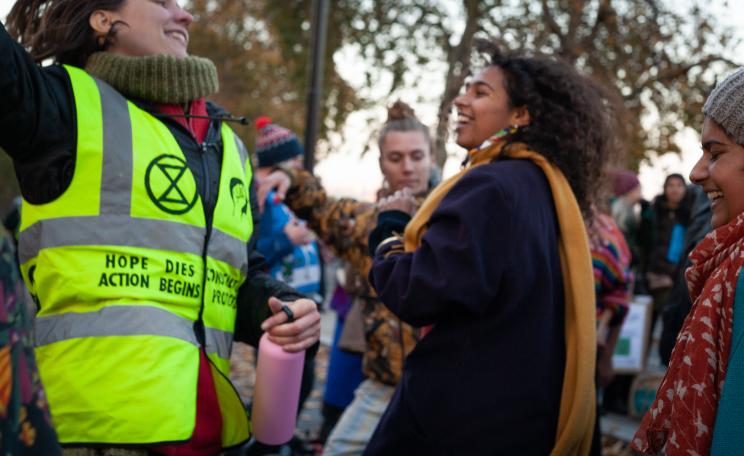There was the ever-present debate around how action is to be escalated given continued ecological breakdown.
A sea of tents appears in one of the city parks of Hanover in Germany during the final days of July. The circus was not in town, despite some of the more extravagant bigtops. Instead, environmentalists were descending on the city.
An estimated two thousand activists passed through Ende Gelände’s System Change Camp from Sunday, 30 July to Monday, 7 August 2023, making it one of the largest political meetings of environmentalists in Europe this year.
Ende Gelände is Germany’s largest climate camp movement. Beginning in the mid-2010s it has regularly mobilised thousands to take direct action in coal mines and against fossil gas. This year’s camp, however, was slightly different.
Volunteer
Rather than the usual combination of action trainings and political discussion, followed by days of action against fossil capitalism, the camp in Hanover was exclusively for political discussion and training.
Several large-scale actions are still planned, such as a camp against fossil gas in Rügen and a camp against the International Motor Show in Munich. However, the Hanover camp represented a focused ‘coming together’ of activists to discuss the pressing concerns the environmental justice movement faces.
Over the seven days of workshops, a dizzying array of discussions occurred. From practical insights into the latest greenwashing uses of bogus ‘carbon capture and storage’ technologies, to debates around how to deal with police repression.
Such discussions were often followed by live music and performances in the evening, or by activist films projected inside tents.
The camp infrastructure itself was substantial. Not only werethere three regular meals for activists present from the main kitchen, but also a creperie and a pizzeria, as well as a bar of soft drinks. All of these were volunteer and donation run by the campers themselves.
Struggles
The topics that emerged in the discussions were strangely comforting - insofar as they revealed that activists across Europe were grappling with problems that environmentalists in Britain are having to face head on.
Firstly, there was the ever-present debate around how action is to be escalated given continued ecological breakdown. For some, more targeted actions are needed, for others the focus was on experimentation in the type of action. Overall, the consensus is that ‘more’ is needed, but what more looks like is still unclear.
Relatedly, there were a lot of conversations on the marked question of dealing with escalation from the police. Activists are facing growing police pressure in Germany, from dawn raids to militarised police evictions.
There was the ever-present debate around how action is to be escalated given continued ecological breakdown.
How they organise around this, and ensure that action can continue sustainably; how we support each other when we face repression were all concerns that were at the forefront of our conversations.
There were also various sessions about struggles and solidarity with Most Affected People and Areas (MAPA) from within the Global North. MAPA activists from Africa and Latin America presented sessions on struggles in their territories, the links to fossil companies in Europe, and discussed how to break through Eurocentricity in the environmental movement.
Variety
Finally, a regularly emerging anxiety was felt around the relationship between the environmental justice movement and the wider world. Many identified a need to link to the ongoing struggles around inflation and the cost of living, as well as workplace struggles.
Of course, none of these discussions can be ‘solved’, even by such a massive seven-day camp. However, the space to discuss, learn from each other’s experiments, and more, ensured everyone left the camp with ideas, learnings, and excitement to act.
Reflecting on this massive effort by European environmentalists, there are a few insights that the British environmental movement could learn from.
Firstly, the distinctive lack of such a space in Britain prevents us learning from each other. Whilst there are camps in Scotland, for the relative size of our environmental movement, there are few cross-group spaces.
At the Ende Gelände camp, Last Generation activists brushed shoulders with youth strikers, left-wing groups, and international solidarity activists. The sheer variety of groups present, irrespective of their ability to agree, ensured a richness to proceedings.
Internationalism
Such an array of activists being together in one space allowed for the debating of the various strategies in front of each other - despite strong and marked disagreements.
Whilst they may not agree, such exchanges likely act in the long run to cool heads between groups and provide for greater solidarity when facing repression and more. Such conversations are unthinkable in the current British environmental movement.
Finally, what stood out for this writer was the relative lack of British activists at the event over the week. For the relative size of our environmental movement, that a dozen or so activists came from Britain speaks to a certain lack of internationalism in our movement.
We will miss the opportunity to learn from our colleagues on the Continent if we continue to hide on our islands. Ecological breakdown has no borders, neither should we.
This Author
Alex James is a freelance journalist.




